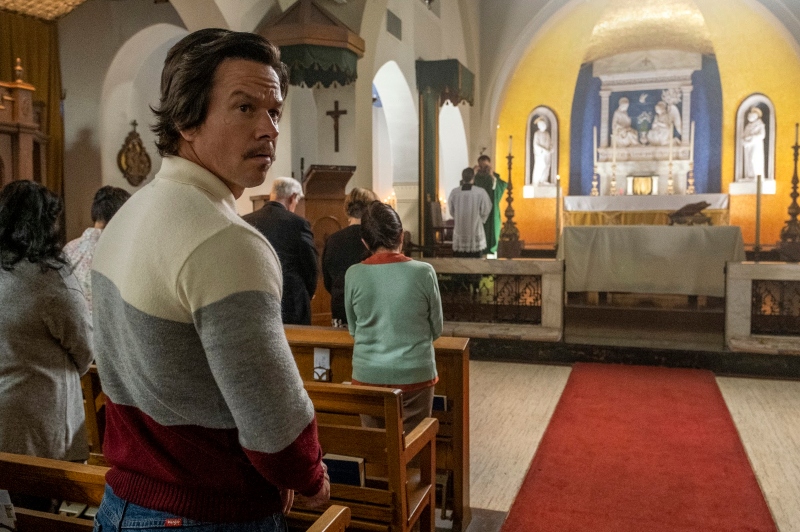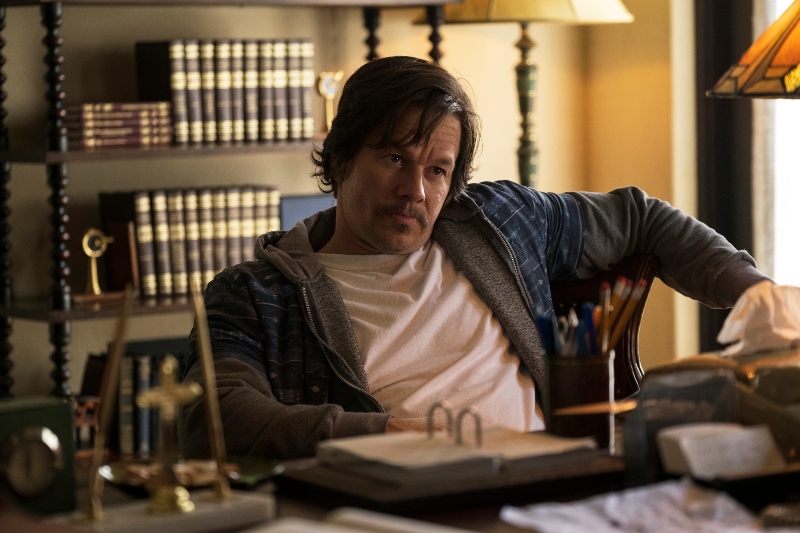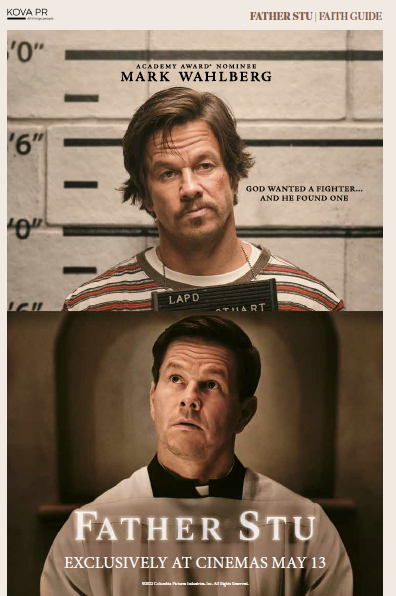Father Stu: The R-Rated Christian Film
The true life story of a damaged man training for the priesthood portrays faith in a realistic and authentic way

To start this review off with a preface. When I say R-Rated I don’t mean R-Rated in the same way that the Deadpool films are, with copious amounts of swearing, violence, and adult themes. Rather Father Stu is R-rated in comparison to other ‘Christian movies’.
If you think Christian movie, your mind may go to Veggie Tails, and the God’s Not Dead series (amongst others), or Noah/Exodus (Biblical films that have little Biblical truth). Faith-based films and media are often seen as corny and cheesy, the writing and acting a bit lacklustre. There is often a resistance to show the ugliness that Christians face in ourselves and in our lives, those issues that everyone else on the planet faces. To quote Mel Gibson, who plays Stuart Long’s father Bill, in an interview with the Daily Wire, 'They keep things pretty sanitised. And that’s not who we are. I mean, hey, we’re here because we’re a bunch of sinners, right?'
They tend to show a pure squeaky-clean Christian, trying to show God’s love and redemption of broken people, without showing the brokenness of those Christians involved, giving the secular viewer a warped idea of Christians and Christianity as a whole, and potentially even turning people away. Christian films made for small groups to discuss on a Tuesday evening with tea and biscuits.
Father Stu, however, is more in line with films like The Silence or Hacksaw Ridge. Still faith-based, but falling more in line with a secular cinema going experience. Stu himself swears and drinks; he’s a charmer who doesn’t take rubbish lying down; and this makes for a real breath of fresh air into the world of faith-based films.
The film is based on the true story of Stuart Long (Mark Wahlberg), a Catholic priest in America, who, after a rough upbringing (a child of divorce, and an alcoholic father, the death of a sibling, a career as a boxer and in general a self destructive manner) turns his life around, joining Catholicism, and trains for the priesthood. It's written and directed by Rosalind Ross in her directorial debut.
In reading Wahlberg's promotional interviews, it's clear this was a labour of love, a story he's wanted to put into the world for some time. Now I like reading this, as it’s clear that the actor, a man who also had a hard early life before finding faith, didn’t want to do this film as a pay cheque but rather to immerse himself into a character he could fully understand and empathise with. A redemption story told by someone who has gone through redemption.
One aspect where Father Stu succeeds above other faith-based films is that it spends a lot of time on Stu before his walk in Christianity begins. It isn’t shy to show a cocky, immature, quick to anger man that Stuart was, nor does it shy away from the toxicity he faced/faces in his life from his mother and father.
However, when he meets Carmen (Teresa Ruiz) he pursues her for the sole intent to get her into bed. In doing so, he begins to come to the church she attends, slowly but surely becoming involved, even if it is for all he believes part of the game to sleep with the forbidden fruit that is this virgin Sunday School teacher.
 From this point the film does not get boring. It isn’t a one-dimensional exploration of the kind of personality that's welcomed into the Catholic priesthood. On the contrary, we see a duality of man. Stu still holds onto his alcohol and bars, his volatile personality traits and driving irresponsibility, but as he begins to court Carmen (over just trying to sleep with her), we also see him joining in at church, engaging in Sunday services, Sunday school services and even baptism.
From this point the film does not get boring. It isn’t a one-dimensional exploration of the kind of personality that's welcomed into the Catholic priesthood. On the contrary, we see a duality of man. Stu still holds onto his alcohol and bars, his volatile personality traits and driving irresponsibility, but as he begins to court Carmen (over just trying to sleep with her), we also see him joining in at church, engaging in Sunday services, Sunday school services and even baptism.
At the point Stu becomes a Christian, aided by both a metaphysical meeting of Jesus in a bar, and vision of Mary after a near fatal crash. His bullheadedness directs him to begin his priesthood training, which in turn brings him into often righteous, conflict with his atheist parents, Carmen, the fellow priests-in-training and the Monsignor.
One fantastic quote from the film, said to Stu, was: 'No-one wants to hear the Gospel from the mouth of a gangster.'
How shallow-minded is that. For it turns out that being a gangster, stubborn and with his vocabulary still packed with bluntness and swearing, Stu is exactly what is needed when it comes to talking faith to inmates at a prison, his parents who didn’t accept his priesthood training, and even those in the church itself, who heard The Word from a compactly different viewpoint.
My home church growing up would occasionally have guests in from the Christian Motorcyclists Association, Victory Outreach, a men’s substance abuse rehab home and, a prostitution rehab/halfway house. These were much more compelling versions of the Gospel, more tangible testimonies than someone who for all appearances was and always had been squeaky clean and sanitised, much like the films mentioned at the start.
As the film progresses Stu is struck with the diagnosis of Inclusion Body Myositis (IBM), an incurable and rare muscular disease, and in this came one of my favourite scenes. As we all would with a diagnosis of something so devastating and life shortening, he breaks down, his anger is raw, his lament is laid out there. Not just a small weepy moment but a show of real lament and anger at the God. The film shows the messiness and the ugliness that Christians still go through, and the questions and wobbles in faith even those in priesthood training face. I love this.
The theme of struggle and suffering that Stu endured in life led to and caused redemption, and from seeing faith-based films in youth groups growing up, it is something rarely shown well. Faith-based films which look at suffering as a main theme tend to leave their main characters with less faith at the end rather than more. Father Stu shows a constant struggle and wrestling as the goal of the Christian life; the more Stu struggles with God and others, the closer he gets to them, and is seen and heard by those around him, his parents included, who rekindle their marriage, and having attended his son’s first sermon as a priest, begin their own faith after being aggressively atheist.
I don’t believe the film will be in anyway a smash blockbuster hit, but I hope that this will change the landscape of Christian films, and how faith is portrayed in films and thus in a secular mind set. Compared to a film like The Eyes of Tammy Faye, Father Stu is a Christian film, both made for Christians (ideal to be used for small groups, youth groups, those questioning faith/new to Christianity), but also for the secular film goer. Not only because it’s a good film, but also because it puts Christianity and a redemption story arc in such a good way!
To end this review, I will close off the same way the film ends, with a quote from Father Stuart Long himself:
'It's a profound experience, suffering. And the struggles of this disease, help me and help others, to learn the way we should have been living, all along.?
'It's taught me a little humility, it's taught me dignity, respect for others, and sometimes people like me, there’s an extreme example, we need things like this to be able to make those changes, and decisions in our lives that are going to help us become better people, for us to become the people God wanted us to be.'
 Mat Gale is a Creative Designer with the Baptist Union of Great Britain
Mat Gale is a Creative Designer with the Baptist Union of Great Britain
Interested in discussing and exploring some of the themes Father Stu raises?
Kova PR has created a faith guide, which can be downloaded here.
Baptist Times, 27/04/2022